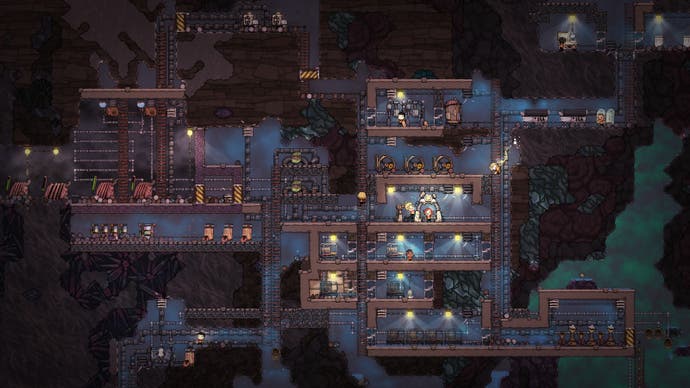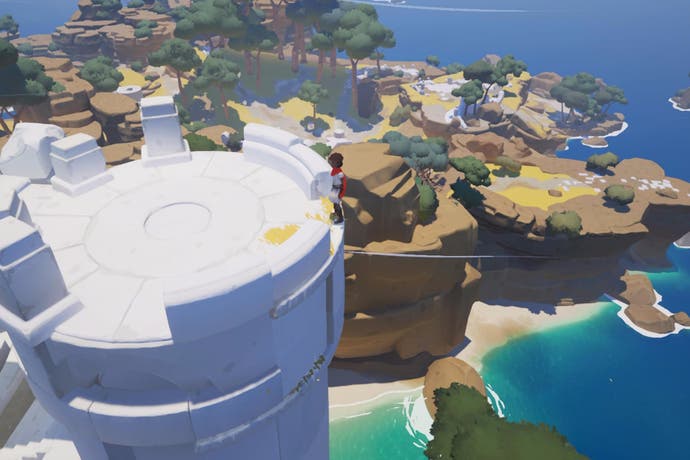Nothing will ever compare with the first level of a new game
Press B to crouch.
One of the things that fills me with joy is the way that games have settled down and become places and preoccupations. They have sent roots into the ground and become a regular, beloved part of their players' lives. I often view these sorts of games from the outside, which is a personal failing, but I still see the evidence of their pleasures regardless. I work with people who know Dota 2 and League of Legends intimately. It is like they have learned an instrument or a new language, and I feel that envy that I sometimes feel for people who have put in real effort and gained real rewards. Lately, I've been starting to take Clash Royale rather seriously, and in my own way I now know what it is like to stop and stay a while with a single game - to commit, to grow to understand, to read patch notes, to have my own thoughts on a balance change or a new addition.
And it's wonderful stuff. Even in my half-hearted way, there is something great about really getting to know a game, to play it early in the morning and to sneak in a go or two before bed. To return to this magical place which is always changing but always the same, a place where everything on-screen seems etched a little deeper, rendered a little more clearly, because of the rich understanding that illuminates it all.
At the same time, though, I am starting to understand another of gaming's great pleasures - or rather I am increasingly aware of something I love that has always, reliably, made me very happy. And it's the complete opposite of the feeling you get when you understand almost everything about a game except what your opponent is going to do. It is the glory of being lost, bewildered, majestically confused. It is the glory of fumbling through the first few moments - or the first level - of a brand new game.

I suspect this is about possibility space, really, although that's one of those awkward phrases I am always certain I am misusing. Still, the first few moments of a game - the first quarter of an hour, sometimes the first hour - exist in this wonderful realm where the game can show you anything, can do anything, and can be anything. The long arm of ritual has yet to grab you. You are in the dark a little bit. You are venturing into the unknown.
For years I've always suspected that the opening stages of a game are a little more polished than everything that follows. I can imagine many reasons why this might be the case, and why it often is the case. But I'm also starting to wonder if you also look at the opening stages of a game a little differently to the way you look at the rest of it. In the opening stages, everything around you might be important: physics objects, things written on signs, tiny finials and detailing on the buildings nearby, marks on pages hidden deep within the pause menu. You don't know which bits of the new world you've been dropped into are going to count in what follows. Any part of the landscape might be crucial.

There's also a sense in these moments that you're testing the game a little, seeing how far the simulation goes, or how far the system allows you to mess with it. Is this the kind of action game where you can flush the toilets, boil the kettles, shoot at the flowers? Is it the kind of card game where you can load your hand with the cheapest junk and still find unexpected synergies?
I could give you a thousand examples of what I'm talking about, and I imagine you probably have a thousand examples too. The one that's freshest in my mind, though, is Rime, a game I've played in the last few weeks. Rime's fresh in my mind because it fares better than most at keeping that sense of an opening level going for a really long time. It is not a hectic game; it's actually quite restful. But Rime never truly settles. You are constantly waiting for it to announce its true intentions, to draw you to a central hub, say, or to make its structure and rituals obvious. It never does, and so it continues to surprise, and to delight.
More than anything, I think I love this opening-moments feeling because it always reminds me that games are, in a weird way, a dialogue - even singleplayer games in which everything is scripted down to the last cutscene. They're dialogues because you are in some manner learning to understand the way that the designers like to think: the way they stage set-pieces, the places they tend to hide collectables, the rhythms and tricks they use to move you from one sequence to the next. The opening moments of a game are where you're investigating this potential relationship in the most direct way. What are you going to show me? Where are you going to lead me? What kind of trust are you willing to place in me?
Often, when we're looking at games, we're using the lens of genre. During the opening moments, however, you sometimes glimpse a new way of seeing them. All games are potential relationships, I think. Is the next one going to be a relationship that's worth remembering?









